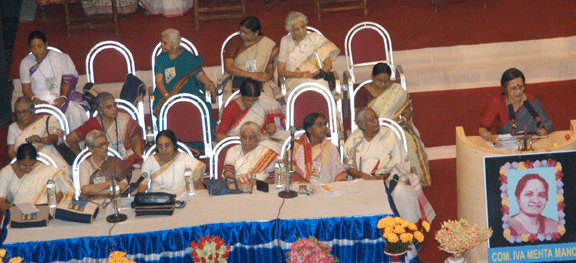 People's Democracy
People's Democracy
(Weekly
Organ of the Communist Party of India (Marxist)
No. 44
November 04, 2007
(Weekly
Organ of the Communist Party of India (Marxist)
|
Vol.
XXXI
No. 44 November 04, 2007 |
8TH All India Conference Of AIDWA Begins

Brinda Karat delivering the inaugural address
G Mamta from Kolkata
THE 8th All India Conference of the All India Democratic Women’s Association (AIDWA) began on November 1, 2007 at Purbashree, Salt Lake Kolkata. The venue has been named after the late veteran AIDWA leader Comrade Kanak Mukhopadhaya while the dais has been named after the late Gujarat AIDWA state secretary Iva Mehta. Around a 1000 delegates and invitees from 22 states are attending the conference.
The conference started with the flag hoisting by Subhashini Ali, president of the organisation. Delegates later paid homage at the martyrs column, followed by a song commemorating the martyrs by IPTA, West Bengal. The inaugural session of the conference began with the election of the presidium comprising Subhashini Ali, Shyamali Gupta, Pramila Pandhe, Brinda Karat, M C Josephine, Mythali Sivaraman, Anjali Devbarman, P K Zainaba, Vibha Ghosh Goswami and Kalindi Deshpande. A condolence resolution was placed by Shyamali Gupta, working president of India.
SPECIAL ADDRESS BY JYOTI BASU
In a special address to the conference, Jyoti Basu, CPI(M) Polit Bureau member and president of the Reception Committee, recalled that when he joined the Left movement 60 years ago, social reform, including the abolition of the caste system was an important part of struggles. He called upon people to bring this spirit of a progressive outlook back into politics. These are not just issues for the women’s movement, but for political parties as well. There was a greater need to focus on the youth and to hear their voices. In West Bengal there has been emphasis on a radical land reform programme which has given joint pattas to women. He said that in panchayat raj institutions, West Bengal women occupy 42 per cent of seats, exceeding the given reservation quota by the 73rd Constitutional amendment which highlights the priority given to the political participation of women. A separate department has been created to look after seven lakh Self Help Groups and self employment, which is first of its kind in the country. However, the large majority of women in the country remain in the unorganised sector. Jobs are scarce and the current high rates of growth do not necessarily translate into benefits for the masses. Women with an independent income had a better chance of resisting violence, he said. There is a need to question the job-reducing economic policies of the central government.
Inaugurating the conference, Brinda Karat, AIDWA vice president and CPI(M) MP, called upon women to advance their struggle for a life with dignity and equal opportunity. Questioning the paradigm of neo-liberal development, she pointed out that in a country where 30 crore of people earn less than Rs 20 a day, there are more than 30 billionaires who figure among the world’s richest. Globalisation has intensified the inequalities between social classes. There is a need to strengthen women’s struggles for democratic rights and livelihood. Even as it highlights the commonality of gender-based oppression, the women’s movement today needs to focus on the specific issues faced by women from dalit, adivasi and minority groups.
She congratulated the people of Kolkata who rose up to seek justice for Rizwanur Rehman; she expressed solidarity with his mother and called for stringent action against those responsible for his death. In sharp contrast, in Haryana, there have been 104 cases involving atrocities against inter-caste/ community/ choice based marriages in the last four months with no social reaction, nor any action against the guilty. There is a growing trend to impose social control over women’s lives and bodies. The alarming decline in sex ratio whereby 40 lakh female foetuses have been aborted since 1994, with affluent educated families leading in son preference, reflects the continued discrimination women face in India.
Women cannot be free in an unfree nation, she said. The women’s movement was born in the crucible of the freedom struggle in India, and today when imperialism seeks to control the world through its might, control over markets and its ideological influence over the minds of people through the media, there is a greater need for the women’s movement to confront imperialist forces, particularly in the sub continent. There is also a need to forge links with the progressive Left and secular political forces and strengthen the efforts of Left-led governments, which have provided concrete alternatives. These governments should also be more pro-active in advancing gender-sensitive policies.
Karat congratulated the organisation for expanding its membership to over one crore spreading to 22 states across the country, as a result of the organisation continuously intervening on different issues of women in the last 25 years.
The conference was greeted by Saleeha Sultana, joint secretary of the Nari Mukti Sansad, Bangladesh, who recalled our common history of anti-imperialism as well as the common dangers in the face of patriarchy, feudal culture and fundamentalism that grip our region. While the social constraints have to be fought, globalisation has intensified the struggle for survival, she said. Annie Raja, general secretary, NFIW also greeted the conference.
Usha, from Mudigonda, Khammam district in Andhra Pradesh, widowed by police firing on those struggling for housesites, inspired the delegates by her courage and resolve to continue the struggle. Bharati, an AIDWA activist from Bidar district in Karnataka recounted the struggle to get the NREGA implemented. Both were felicitated by the conference.
Three sportswomen from West Bengal - Dola Banerjee (archer), Jhulan Biswas (cricketer) and Rashmi Sen (swimmer) were felicitated at the conference. A resolution on the issues of sportswomen was placed by Jagmati Sangwan, Haryana and supported by Jyotirmoyee Sikdar, MP and another resolution calling upon the UPA government to halt the Indo-US nuclear deal was placed by U Vasuki, Tamilnadu and seconded by Rama Das from Tripura.